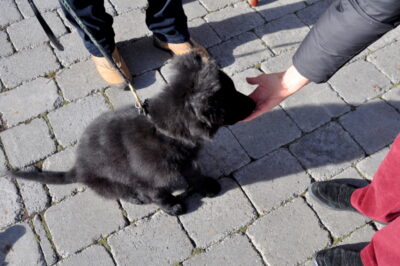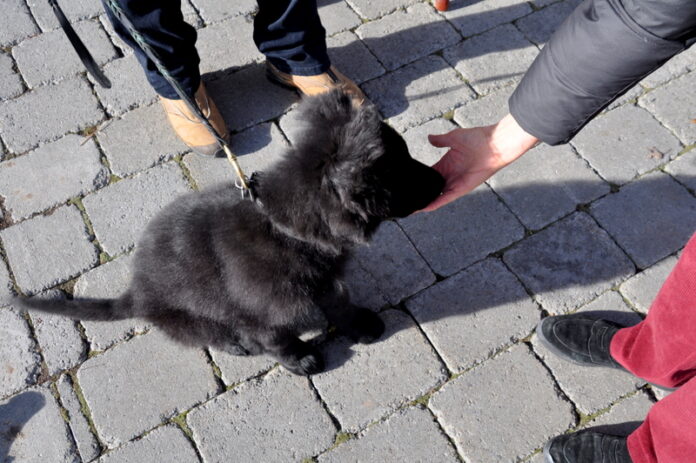By Fran Jewell

Kalidor has been cruising right along, learning all kinds of things, including imprinting of behaviors I want to see the rest of his life. I have until he is 16 weeks old to teach him those vital things. Who he will be is a combination of genetics and experiences. Critical to me is the sport of competition tracking, so Kalidor has already had many experiences on the tracking field.
More critically is that I want Kalidor to focus on me with a calm, confident manner so he learns to “defer” to me in my leadership. In the long run, I want him to learn to depend on me to guide him through life as I set boundaries and provide encouragement. Avoiding overstimulation is really important for Kalidor to learn self-control, which he is totally capable of at this age. While I want to socialize Kalidor with both people and other dogs, I DO NOT want him thinking that all dogs and people mean out-of-control, wild jumping, biting behaviors. What he learns NOW in self-control will last his lifetime.
Just as with children, who must learn self-control in the classroom and on the playground, puppies need to learn the same thing. Somewhere along the way we dog owners have come to believe that wild, non-stop play sessions with a multitude of dogs is a good thing and that jumping, mouthy greetings with people is friendly.
When Kalidor is overstimulated with dog play, he can no longer function appropriately. Studies are showing that play any longer than 3 to 7 minutes turns into what is called “ritualized aggression,” or what I call “RA-RAs.” Just like children when they get overstimulated, they can start hitting, bullying and name-calling. Practicing ritualized aggression sets a puppy up for dealing with other dogs in a more aggressive manner as they mature. They can even become fearful, resentful, or angry with other dogs. What I want to do is give Kalidor short play sessions with other puppies. Then we take a break for a while, or we walk. Breaks should consist of exploration of the environment and practicing natural skills like hunting. It should also involve practicing basic obedience skills like sit, down and watch with me.
The same is true for interactions with people. A large group of people is overwhelming and overstimulating for puppies. I am giving Kalidor short, directed interactions, where he is asked to sit for petting and given treats. This helps him to see that friendly strangers are a good thing. Letting him run crazy up to people, jumping, barking, lunging, mouthing is not going to make points for him as he matures, especially for a German shepherd.
Fran Jewell is an IAABC Certified Dog Behavior Consultant, NADOI Certified Instructor and the owner of Positive Puppy Dog Training, LLC in Sun Valley. For more information, visit positivepuppy.com or call 208-578-1565.



